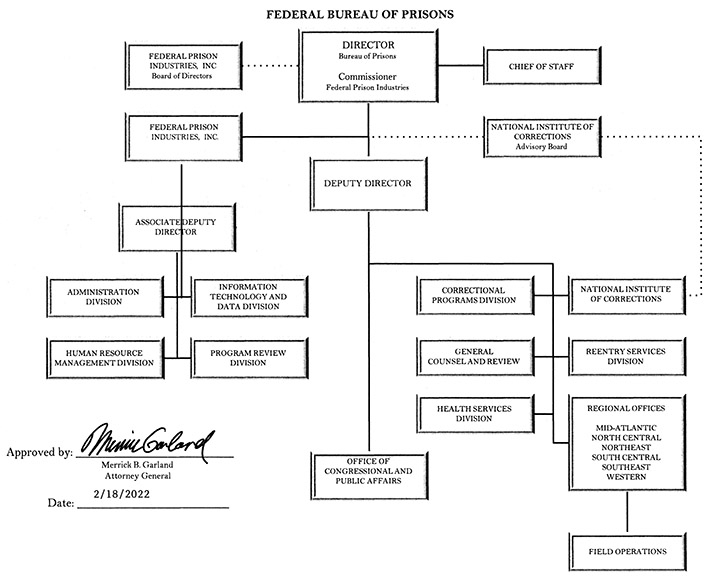Federal Bureau of Prisons

- Director Bureau of Prisons
- Commissioner, Federal Prison Industries
- Chief of Staff
- Federal Prison Industries, Inc. - Board of Directors
- Federal Prison Industries, Inc.
- National Institute of Corrections - Advisory Board
- National Institute of Corrections
- Deputy Director
- Office of Congressional and Public Affairs
- National Institute of Corrections
- General Counsel and Review
- Health Services Division
- Correctional Programs Division - Assistant Director
- Reentry Services Division
- Regional Offices - Regional Directors
- Mid-Atlantic
- North Central
- Northeast
- South Central
- Southeast
- Western
- Field Operations
- Associate Deputy Director
- Administration Division
- Information Technology and Data Division
- Human Resource Management Division
- Program Review Division
Approved by: Merrick B. Garland, Attorney General
Date: February 18, 2022
History
In 1891, Congress passed the "Three Prisons Act," which established the Federal Prison System (FPS). The first three prisons – United States Penitentiary (USP) Leavenworth, USP Atlanta, and USP McNeil Island – operated with limited oversight by the Department of Justice (DOJ). During the 1920s, Assistant Attorney General Mabel Walker Willebrandt was responsible for the FPS and recognized the need for centralized administration and standardized regulations and she pushed for the establishment of a new DOJ agency to oversee the FPS. Following a study of the FPS that highlighted problems, including overcrowding and the lack of meaningful programs for the incarcerated, Congress established the Federal Bureau of Prisons (FBOP) by passing the Act of May 14, 1930 (ch.274, 46 Stat. 325) which was signed into law by President Herbert Hoover.
Mission
Corrections professionals who foster a humane and secure environment and ensure public safety by preparing individuals for successful reentry into our communities.
Major Functions
- Proactively manage the Adult in Custody (AIC) population to ensure safe and secure operations.
- Provide services and programs to address AIC needs, provide productive use-of-time activities, and facilitate the successful reintegration of AICs into society, consistent with community expectations and standards.
- Ensure there is a competent, diverse workforce operating within a professional work environment to meet the current and future needs of the organization.
- Maintain all FBOP facilities in operationally sound conditions and in compliance with security, safety, and environmental requirements.
- Manage operations and resources in a competent and effective manner that encourages creativity and innovation in development of exemplary programs, as well as excellence in maintaining the basics of correctional management. Continually strive to improve the effectiveness of resources and deliver services efficiently.
- Continue to seek opportunities to expand the involvement of community, and local, state, and federal agencies, in improving the effectiveness of the services provided to AICs and constituent agencies. Seek to improve partnerships that will allow the FBOP to carry out its mission within the criminal justice system and to remain responsive to other agencies and the public. Develop partnerships to focus the shared responsibility for the establishment of a supportive environment to promote the reintegration of offenders into the community.
- Provide for public safety and security by focusing on preventing, disrupting, and responding to terrorist activities.
FBOP encompasses two subcomponents:
Federal Prison Industries, Inc. (FPI)
Federal Prison Industries, Inc. (FPI), a wholly owned government corporation, was created by statute (P.L. 73-461) on June 23, 1934, and implemented by Executive Order No. 6917, signed by President Roosevelt on December 11, 1934.
The mission of Federal Prison Industries, Inc., is to provide training and employment for incarcerated adults confined in FBOP institutions.
The major functions of the FPI are to:
- Exercise jurisdiction over industrial enterprises of all FBOP institutions.
- Maintain a diversified program of industrial operations that ensure optimum employment of incarcerated individuals.
- Provide a wide range of products and services to other federal agencies at fair market prices, structuring product lines to minimize competition with private sector industry and labor in any particular product or service area.
- Provide job skills training and work opportunities for adults in federal prison, maximizing their chances to secure work upon their release, and successfully reenter society as contributing, tax-paying citizens.
- Enhance both employee and inmate security and safety by providing a safe, secure, and meaningful work environment for a substantial number of incarcerated individuals, keeping them productively engaged and reducing prison idleness.
National Institute of Corrections (NIC)
The National Institute of Corrections (NIC) is a national center that provides aid to federal, state, and local correctional agencies and works to advance the practice of corrections throughout the country. The NIC was created by statute (P.L. 93-415) on September 7, 1974.
The National Institute of Corrections is a center of learning, innovation and leadership that shapes and advances effective correctional practice and public policy. It works to collaboratively respond to the needs of the corrections field by providing information, education, assistance, and training to correctional agencies.
The major functions of NIC are to:
- Provide aid to federal, state, and local correctional agencies, and work to advance the practice of corrections throughout the country.
- Provide training, technical, and practical assistance, information clearinghouse services, and to support promising practices with research and implementation, all to reinforce policy formulation to advance correctional practices in prisons, jails, and community corrections agencies.
- Provide leadership to influence correctional policies, practices, and operations nationwide in areas of emerging interest and concern to correctional executives and practitioners as well as public policymakers.

